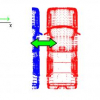Free Online Productivity Tools
i2Speak
i2Symbol
i2OCR
iTex2Img
iWeb2Print
iWeb2Shot
i2Type
iPdf2Split
iPdf2Merge
i2Bopomofo
i2Arabic
i2Style
i2Image
i2PDF
iLatex2Rtf
Sci2ools
CVPR
2008
IEEE
2008
IEEE
Particle filtering for registration of 2D and 3D point sets with stochastic dynamics
In this paper, we propose a particle filtering approach for the problem of registering two point sets that differ by a rigid body transformation. Typically, registration algorithms compute the transformation parameters by maximizing a metric given an estimate of the correspondence between points across the two sets of interest. This can be viewed as a posterior estimation problem, in which the corresponding distribution can naturally be estimated using a particle filter. In this work, we treat motion as a local variation in pose parameters obtained from running a few iterations of the standard Iterative Closest Point (ICP) algorithm. Employing this idea, we introduce stochastic motion dynamics to widen the narrow band of convergence often found in local optimizer functions used to tackle the registration task. Thus, the novelty of our method is twofold: Firstly, we employ a particle filtering scheme to drive the point set registration process. Secondly, we increase the robustness of t...
Computer Vision | CVPR 2008 | Iterative Closest Point | Particle Filtering Approach | Particle Filtering Scheme | Point Set Registration | Transformation Parameters |
Related Content
| Added | 12 Oct 2009 |
| Updated | 28 Oct 2009 |
| Type | Conference |
| Year | 2008 |
| Where | CVPR |
| Authors | Romeil Sandhu, Samuel Dambreville, Allen Tannenbaum |
Comments (0)

